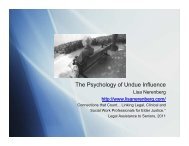Undue Influence: Definitions and Applications - California Courts ...
Undue Influence: Definitions and Applications - California Courts ...
Undue Influence: Definitions and Applications - California Courts ...
You also want an ePaper? Increase the reach of your titles
YUMPU automatically turns print PDFs into web optimized ePapers that Google loves.
The Building Blocks of <strong>Undue</strong> <strong>Influence</strong><br />
Although the psychology of undue influence is not yet well understood, a framework for<br />
underst<strong>and</strong>ing it seems to be emerging, which highlights the following features:<br />
1) Factors affecting susceptibility or vulnerability;<br />
2) Roles <strong>and</strong> relationships between victims <strong>and</strong> abusers;<br />
3) Psychological manipulations <strong>and</strong> techniques; <strong>and</strong><br />
4) Outcomes.<br />
1. Victims’ Vulnerability<br />
The literatures on undue persuasion <strong>and</strong> mind control contain numerous examples of<br />
“normal” people being induced or persuaded into doing things they would not have done<br />
otherwise. There is no evidence to suggest, for example, that prisoners of war who renounced<br />
their governments or turned on comrades were different from those who did not in terms of their<br />
cognitive functioning. Similarly, there is no reason to believe that hostages, victims of domestic<br />
violence, or cult inductees fall outside the boundaries of normalcy. Some experts in fact have<br />
posited that “virtually anybody can be unduly influenced if the influencers or techniques used<br />
against them are powerful enough” (Singer, 1992). However, certain conditions are believed to<br />
render certain people more vulnerable or susceptible. These include either permanent or<br />
temporary impairments that result from illness, accidents, or decline, or induced states (e.g, by<br />
withholding food, water, medications, or care). Some conditions, such as debilitating grief<br />
reactions, are related to situations or circumstances.<br />
Perhaps the most commonly cited vulnerability associated with undue influence is<br />
diminished mental capacity. In fact, some analysts believe that there must be some level of<br />
cognitive impairment for undue influence to occur. Others concede that while diminished<br />
capacity is not a requirement for undue influence, it is easier to unduly influence those who have<br />
impairments.<br />
<strong>Courts</strong>, in evaluating undue influence, have tended to focus on victims’ cognitive<br />
capacity <strong>and</strong> lawyers have noted that it is easier to prove undue influence in cases where victims<br />
have cognitive impairments (American Bar Association <strong>and</strong> American Psychological<br />
93




